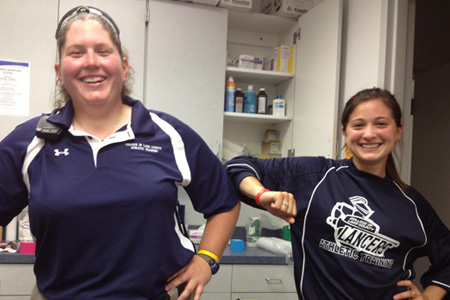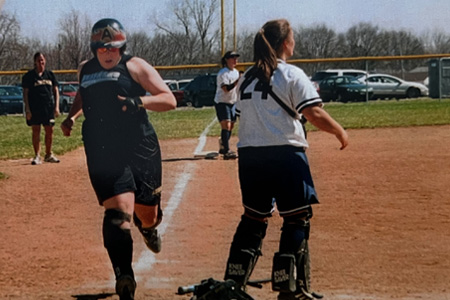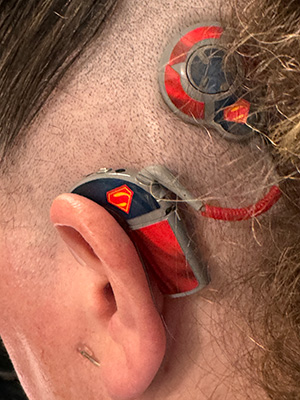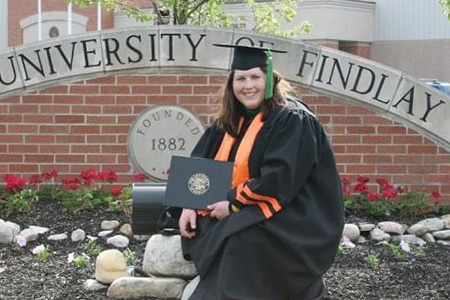A Breakthrough Solution
“If you've ever been in a place where it's so quiet that it’s loud, that’s kind of the feeling.”
 Jessica VanTroostenberghe, an athletic trainer in Big Rapids, Michigan, has lived most of her life without the sounds that many take for granted. Born with normal hearing, she began losing it early. By four, she was wearing hearing aids. By seven, her mild hearing loss plummeted to what’s known as profound hearing loss.
Jessica VanTroostenberghe, an athletic trainer in Big Rapids, Michigan, has lived most of her life without the sounds that many take for granted. Born with normal hearing, she began losing it early. By four, she was wearing hearing aids. By seven, her mild hearing loss plummeted to what’s known as profound hearing loss.
“This means I wasn’t able to hear anything without amplification,” Jessica says. “If I didn’t have hearing aids in, and I were to put my head right against a speaker playing music with lots of bass, I could feel the vibrations but couldn’t actually hear anything.”
Then, in high school she was in a car accident and was unable to tolerate any type of sound in her left ear.
Learning to adjust
While Jessica had dealt with her hearing issues from a young age, for the most part she didn’t think of them as difficult.
“It was normal for me,” she says, “I just wanted to make my family proud and be successful.”
But there were frustrating moments, including during certain types of communications. She learned to lip read, but when she was talking to someone and they turned away from her so she couldn’t see their lips, her world would go silent once again. This would also happen in school, when the teacher would turn away from her to face the board while talking.
Kids in school posed another challenge.
“When you're wearing hearing aids, you're different, right? Well, we're not really that different,” Jessica says. “It's no different than wearing glasses or using a cane or having a prosthesis on. It's just something that makes us unique. And so kids could give me a hard time.”
It didn’t help that Jessica had to wear an FM unit (frequency modulation system), which included a box that was attached to the side of her hip, with cords extending up to her ears.
“I just kept working at it,” Jessica says. “I was faced with these situations, but I wanted to hear, I wanted to be involved. So I did whatever I could to make that happen.”
Finding new hope
 As she was growing up, Jessica and her family also researched cochlear implants.
As she was growing up, Jessica and her family also researched cochlear implants.
A cochlear implant is a surgically implanted electronic device that can restore useful hearing and provide improved communication abilities for individuals who receive little or no benefit from appropriately fit hearing aids. A cochlear implant transforms sound into electrical signals and uses those signals to directly stimulate the hearing nerve.
When Jessica first heard about implants, the technology was newer, and her doctors cautioned her about them.
“They’d say, ‘Don’t do it. Wait as long as you can,’” Jessica says.
However, as she got older and entered her athletic training career, Jessica found herself struggling to keep up with conversations and missing essential cues from colleagues, students, friends and family.
“I could tell I was missing more and more,” she says. “And I was tired of it.”
Jessica works as an athletic trainer at both a local high school and a physical therapy practice. And she began noticing patients at both places who had cochlear implants—and were thriving.
“I worked with a student wrestler and football player who had a cochlear implant and functioned well with it,” she says. “And one day, while working at my physical therapy clinic, I met another patient with a cochlear implant. Despite being 60 feet across the room, she could clearly hear and respond to me.”
Then Jessica met one of her best friends who has a cochlear implant.
“She commands boardrooms,” Jessica says. “And I was just in awe. I was like, if she can do that, why can't I?”
A leap of faith
Jessica made the decision to get her own implant, and her audiologist referred her to Henry Ford Health. She met with Laura Brainard, M.D.—an otolaryngologist (ear, nose and throat physician, or ENT), who specializes in ear conditions, including hearing loss—and Chelsea Conrad, AuD, audiologist and clinical program coordinator for cochlear implants.
Both doctors explained the technical advancements that had been made in cochlear implants in recent years, helping to reassure Jessica.
“They didn’t rush me,” Jessica says. “They answered every question and prepared me for every possibility. Their kindness and patience were invaluable.”
Her doctors prepared her for surgery by checking for structural issues in her ear, helping her navigate insurance approvals, explaining how the device would be implanted and more. In December 2019, Dr Brainard surgically implanted Jessica’s first cochlear implant.
Cranking the volume
 Several weeks after cochlear implant surgery, Jessica arrived for her “activation day.” At this appointment, the device is officially turned on. For Jessica, this was overwhelming. Sitting with Dr. Conrad, she felt both excited and terrified.
Several weeks after cochlear implant surgery, Jessica arrived for her “activation day.” At this appointment, the device is officially turned on. For Jessica, this was overwhelming. Sitting with Dr. Conrad, she felt both excited and terrified.
“When they turned it on, the world went from silent to shockingly loud,” she says. “I had no idea my own voice was so loud!”
Jessica’s first experience of sound was also a strange one: garbled and far from the clear speech she’d hoped for.
“It wasn’t what I expected at first,” she says, “but Dr. Conrad reassured me it would improve over time.”
And it did. Jessica began following a strict regimen to help her brain adjust to her cochlear implant, listening to audiobooks and familiar songs, and even using her GPS as a tool.
“I’d drive around, knowing where I was going, just to match what I heard from the GPS with what I saw on the road,” she says. “Gradually, the sounds became clearer.”
A more fulfilling life
With the ability to hear clearly comes the opportunity to experience life at a deeper level. Within weeks of her surgery, Jessica found herself hearing sounds she’d never known.
“One day while hiking, I heard what sounded like plastic bags crinkling,” she says. “It turned out to be leaves rustling in the wind.”
She also began picking up on the subtle calls of birds and background noises in crowded places that had once been muddled or silent.
“The world is so noisy, and I love it,” Jessica says.”
The implant also had a dramatic effect on her career. As an athletic trainer, Jessica needs to communicate with injured athletes quickly and accurately.
“When a student was face down on the field with a helmet on, I could actually hear him now and understand what he was saying,” she says. “Before, I had to guess. Now, I feel like a better clinician.”
Lifting the fog
 The impact of her cochlear implant has extended beyond Jessica’s professional life. For example, she doesn’t avoid noisy restaurants anymore.
The impact of her cochlear implant has extended beyond Jessica’s professional life. For example, she doesn’t avoid noisy restaurants anymore.
“With the forward focus on my implant, I can drown out background sounds and focus on the person in front of me,” she says. “It’s a huge improvement.”
She has also noticed differences in her personal relationships. One day, while relaxing at home, a friend’s voice from another room startled her.
“She was shouting, and I thought something was wrong,” Jessica says. “She laughed and told me that’s how she’d always spoken to me before. I hadn’t realized how loud she’d been because I just couldn’t hear it.”
Jessica’s family and friends have noticed her increased engagement and confidence.
“It’s like a fog has been lifted,” she says. “I feel more present, more connected. I’m better equipped to navigate conversations and social settings.”
As for her team at Henry Ford Health, she is deeply grateful.
“They have given me the opportunity to be a better person, to be a bigger person, to help others, and to be better for myself and my family, as well as my patients,” she says.
.svg?iar=0&hash=F6049510E33E4E6D8196C26CCC0A64A4)

/hfh-logo-main--white.svg?iar=0&hash=ED491CBFADFB7670FAE94559C98D7798)